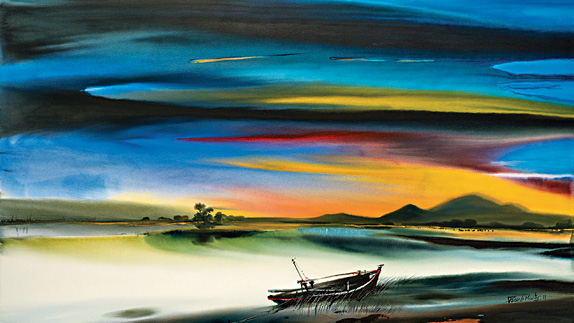The tone for Noise of Many Waters: Four Decades by Paresh Maity (on view till December 11) is set long before one enters CIMA Gallery with the sound of thunderclouds rolling in and the incessant patter of rain from a water installation outside the building. The sound becomes more delicate, with raindrops dripping from leaves after the clouds have scattered, as one enters the gallery to be greeted by a vivid video installation that plays audio and video montages in a loop. While the audio resonates throughout the gallery, the eye is instantly drawn to the flame-red skies of Benaras, a small but striking frame, where the river reflects the same ominous hue.
Placed in clever contrast to the dark shades of sunset to show Maity’s range, the next few works display the most delicate of monotonal washes, especially in Broken House, where Maity brings out depth and shadows with little more than watercolour dissolved in water. Similar deftness with the brush and eye for detail are evident in The River Bank where the river itself is a wide, still expanse that is almost invisible: the life surrounding it — animals, people, houses — is captured in darker shades. As someone who grew up on Bengal’s verdant floodplains, Maity is keenly attuned to the bustle of the lives that are sustained by water.
Watercolour is among the most unpredictable and difficult of media; it takes a consummate artist to be able to tame water into flowing as desired over the sheets. Maity has mastered this skill — the water-laden dark clouds that hang heavy over many of the landscapes are seamlessly blended and, on closer scrutiny, they almost seem to come alive and spread over the paper following the artist’s original brushstrokes as in Anjuna Beach. The bigger the canvas, the trickier it is to regulate watercolours, yet seeing the stunning 55” X 96” Symphony of Colours (picture) with its aurora-like sky is akin to looking out at a surreal landscape. Maity also uses the absence of water to striking effect — cleverly orchestrated dry patches of canvas become the froth of the waves, the glimmer on the surface of a river set alight by the setting sun as well as a clear swathe of sky peeping out from behind the clouds.
While some canvases are an interplay of jewel blues, iridescent greens, bright yellows, others, such as A Floating World and Morning Passion, use a single dominant colour — leaf green and crimson in these works — to paint entire riverscapes with a variation of shades. In a series of nimble pen-and-ink sketches, the artist captures the riverscapes of cities and countries as disparate as Santiniketan, Varanasi, Venice, Croatia, Turkey and Norway. In places, Maity leaves the faintest of pencil etchings to add details to his scenes; in other canvases, he wets the paper in varying degrees to bring out different textures. In some works, deep and dry layers of paint define shadows, in others, the lightest of washes dry into an almost sooty layer to suggest mist. In this rare instance of a curated retrospective, the viewer can trace Maity’s career from the promise held in the miniatures done as a student to the master at work on the gigantic landscapes from recent years, with the sound of rain, rivers and thunderclouds for company.
In juxtaposition to his ephemeral watercolours are the sturdy bronze sculptures by him on display at Cast (on view till December 16) at the Birla Academy of Art and Culture, in association with Gallery Art Exposure. The most imposing of these are Motion — where Maity moulds junk into a horde of grasshoppers in frenzied motion against a concrete wall, all racing towards an invisible target — and Vigour — a celebration of the feminine divine.










